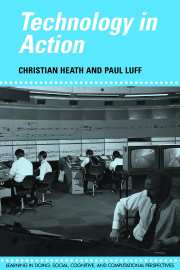Book contents
- Frontmatter
- Contents
- Preface
- 1 Technology and social action
- 2 Documents and professional practice: ‘bad’ organisational reasons for ‘good’ clinical records
- 3 Animating texts: the collaborative production of news stories
- 4 Team work: collaboration and control in London Underground line control rooms
- 5 The collaborative production of computer commands
- 6 ‘Interaction’ with computers in architecture
- 7 Reconfiguring the work space: media space and collaborative work
- 8 Organisational interaction and technological design
- References
- Index
1 - Technology and social action
Published online by Cambridge University Press: 22 September 2009
- Frontmatter
- Contents
- Preface
- 1 Technology and social action
- 2 Documents and professional practice: ‘bad’ organisational reasons for ‘good’ clinical records
- 3 Animating texts: the collaborative production of news stories
- 4 Team work: collaboration and control in London Underground line control rooms
- 5 The collaborative production of computer commands
- 6 ‘Interaction’ with computers in architecture
- 7 Reconfiguring the work space: media space and collaborative work
- 8 Organisational interaction and technological design
- References
- Index
Summary
The full introduction of the computer system effectively did away with the radio and telephone calls to stations, with the computer dispatching crews to answer calls. But within hours, during the morning rush, it became obvious to crews and control room staff that calls were going missing in the system; ambulances were arriving late or doubling up on calls. Distraught emergency callers were also held in a queuing system which failed to put them through for up to 30 minutes.
Ian MacKinnon and Stephen Goodwin (Independent 29 October 92)The medium-term future [1983–90], therefore, will see the first shift towards a decentralisation of commercial and business life. The importance of the city office, with its mêlée of agitated human beings passing each other redundant messages of paper and the printed word, will be rapidly eroded. More and more often, office and home will be combined, the public transport system will give way to giant data communication networks, the business motorcar will be traded in for the latest videoconference system. For the first time since Man began to behave as a social animal and gather his kind together into ever larger working and communicating units, a significant trend will emerge. The cities will empty and expensive office blocks will gather dust. For centuries Man has been accustomed to the notion that he must travel to find his work; from the 1980s into the 1990s the work – such as is to do – will travel to meet Man.
Evans (1979: 142)- Type
- Chapter
- Information
- Technology in Action , pp. 1 - 30Publisher: Cambridge University PressPrint publication year: 2000



